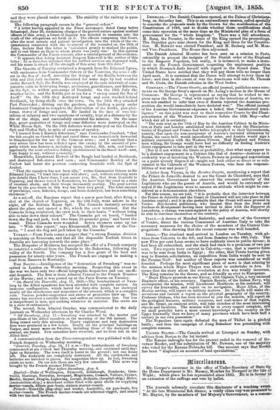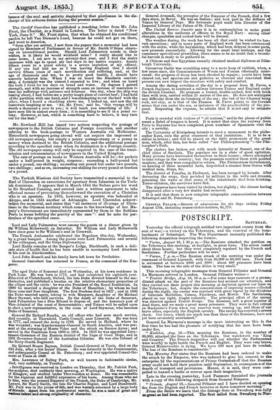311tortilaurnuo.
Mr. Cowpees successor in the office of -Under-Secretary of State for the Home Department is Mr. Massey, Monber for Newport in the Isle of Wight ; which place he his repreaented since 1852. He is in favour el an extension of the suffrage and vote by ballot.
The journals solemnly circulate this disclosure of a touching event. "At the late Ministerial fish dinner, a costly china cup a as presented to Mr. Hayter, by the members of -her Majesty's Government, as a remem-
brance of the zeal and activity displayed by that gentleman in the dis- charge of his arduous duties during the present session."
The Cardif Guardian has published a touching letter from Mr. John Frost, the Chartist, to a friend in London. The letter is dated "New York, June 9." Mr. Frost states, that when he obtained his conditional pardon he left Van Diemen's Land, because he could not get on there, and went to America.
"Soon after our arrival, I saw from the papers that a memorial had been signed by Members of Parliament in favour of Mr. Smith O'Brien obtain- ing an unconditional pardon. Should Lord Palmerston accede to their wishes, is it likely he would withhold mine ? I really should like to come home. I am now in my seventy-first year, and I find the desire increases with age to spend my last days in my native country. Surely fifteen years in a penal colony is a severe expiation of my offence. If any one had told me as I was leaving England that I should survive fifteen years of such mortification and suffering, and, at the age of threescore and ten, be in pretty good health, I should have scarcely believed him. When I was on board the Mandarin convict- ship, a fortnight was the utmost I expected to live ; and when on board the hulk I lived for ten days on bread and water. By degrees I gained strength, and with an increase of strength came an increase of resolution to bear my sufferings with patience and firmness. One day, when the ship was tossing about, I had before me a pretty tough piece of convict beef; I had hold of the partition with one hand, and I was attempting to cut the beef with the other, when I heard a chuckling above me. I looked up, and saw the old boatswain laughing at me. Mr. Frost,' said he, this voyage will be worth a thousand a year to you ; it will teach you something of life.' I have seen life in almost every form; it is something to see it in a penal co- lony. However, at last, which is something hard to believe, it may tarn out for the best."
Mr. Rowland Hill has issued two notices respecting the postage of newspapers to the British Colonies and Foreign countries, and another relating to the book-postage to Western Australia via Melbourne. Henceforth newspapers going abroad will not require the impressed or old newspaper-stamp, but simply a penny postage-stamp or a penny in money when destined to the British Colonies, and the additional postage according to the specified rates when its destination is a Foreign country. The old newspaper-stamp will only be required in the case of the trans- mission and retransmission of newspapers in the United Kingdom.
The rate of postage on books to Western Australia will be—for packets under a half-pound in weight, sixpence ; exceeding a half-pound but under a pound, one shilling ; exceeding one pound but under two pounds, two shillings ; and so on, increasing one shilling for every pound or fraction of a pound.
The Turkish Missions Aid Society have transmitted a memorial to the Earl of Clarendon on executions for apostacy from Islamism in the Turk- ish dominions. It appears that in March 1844 the Sultan gave his word to Sir Stratford Canning, and entered into a written agreement to take effectual means of preventing thenceforward the execution of a Christian Who is an apostate. In 1852, however, an apostate was beheaded at Aleppo, and in 1854 another at Adrianople. Lord Clarendon acknow- ledges the memorial, and states that " all instances of ill-usage of Chris- tians in the Ottoman territory which come to the knowledge of her Ma- jesty's Government are immediately represented by them to the Sublime Porte in terms befitting the gravity of the case ": and he asks for par- ticulars of the specified cases.
Lord and Lady Palmerston were among the guests at a dinner given by Sir William Molesworth on Saturday. Sir William and Lady Molesworth have since gone to Sir William's seat in Cornwall.
The French Ambassador celebrated the Napoleon fete-day, Wednesday, by a grand banquet. Among the guests were Lord Palmerston and several of his colleagues, and the Corps Diplomatique.
• Lord Haddo remains at the Ranger's Lodge, Blackheath, in such a deli- cate state of health that he has been unable to accompany Lord Aberdeen to his seat in Aberdeenshire.
. Lord John Russell and his family have left town for Perthshire.
• General Canrobert has returned to France, at the command of the Em- peror.
The aged Duke of Somerset died on Wednesday, at his town residence in Park Lane. He was born in 1775, and had completed his eightieth year. Educated at Christchurch, Oxford, the late Duke devoted himself to the ma- thematics, and published a treatise on the relative elementary properties of the ellipse and the circle : he was also President of the Royal Institution. In 1800 he married a daughter of the Duke of Hamilton ; by whom he had three sons and four daughters. The first Duchess died in 1827; and in 1836 the Duke roamed again, taking to wife Margaret, daughter of Sir Michael Shaw Stewart, who still survives. By the death of the Duke of Somerset, Lord Palmerston has a Blue Riband to dispose of, and the honorary post of Vice-Admiral of the coast of Somereetahire ; and Totnes will be called upon to elect a new representative, in the roam of Lord Seymour, who becomes Duke of Somerset.
General Sir Richard Bourke, an old officer who had seen much service, died recently, at Thornfield, Castle Connell, near Limerick. He was born in 1777, and entered the Army in 1798. He served in Holland, where he Was wounded ; was Quartermaster-General in South America, and was pre- sent at the storming of Monte Video and the attack on Buenos Ayres ; and served in the Peninsula from 1809 to 1814. In 1825 he was appointed Lieu- tenant-Governor of the Eastern district of the Cape of Good Hope, and in 1831 Governor-General of the Australian Colonies. He was also Colonel of the Sixty-fourth Regiment.
Sir Edward Stuart Baynes, British Consul-General at Tunis, died on the 23d July, after a few hours' illness. He was formerly in the Commissariat, and subsequently Consul at St. Petersburg ; and was appointed Consul-Ge- neral at Tunis in 1849.
Mrs. Lawrence of Ealing Park, so well known in fashionable dudes, died, very suddenly, on Tuesday.
-Intelligence was received in London on Thursday, that Mr. Patrick Park, the sculptor, died suddenly that morning, at Warrington. He was a native of Glasgow, and studied under Thorwalsden at Rome. Ile was remarkable for the vigorous and faithful expression of his busts. Among those who sat to him, were the present Emperor of the French, the Duke of Cambridge, Mr. Layard, Sir Harry Smith, the late Sir Charles Napier, and Lord Dundonald. Mr. Park was in the prime of life, and was warmly esteemed by a large body of friends. Apart from his professional merits, he was a man of great and various talent and strong originality of character. General Armancli, the preceptor of the Emperor of the French, died a few days since, in Savoy. H' e was an Italian; and took part in the defence of Venice by General Pepe. His fortunate pupil made him Director of the Imperial Library of the Palace of St. Cloud.
The United Service Gazette says it is in contemplation to make great alterations in the uniforms of officers in the Royal Navy : among other changes, epaulettes and cocked-hats will be disused.
The weather during the week has been all that could be wished for har- vest operations ; and in many parts of England work has been commenced with the sickle, while the haymaking, which had been delayed in some parts, now proceeds successfully. Allowing for the usual local mishaps, and the customary agricultural grumbling, there seems to be no doubt that a bounti- ful harvest is ready to be gathered in.
A Chinese and four Egyptians recently obtained medical diplomas at Edin- burgh University.
Carnarvon Castle was crumbling away to a mere heap of rubbish, when, a few years since, the Commissioners of Woods and Forests effectually inter- vened : the progress of decay has been checked by repairs ; courts have been cleared out, and apartments and galleries so cleansed and renovated that persons can now inspect the structure with safety and comfort.
Among the daring novelties of the day is a proposal from M. Favre, a French engineer, to construct a railway between France and England under the British Channel. He proposes a tunnel, double-arched, first with brick then with iron, carried within 25 metres of the sea. He does not anticipate any difficulty from the in-breaking of the sea ; the bed of the Channel being rock, not clay, as is that of the Thames. M. Fevre points to the Corn i h mines that run under the sea, as instances of the practicability of the pro- posal. Respecting the expense, he admits that it is not easy to estimate that.
Paris is crowded with visitors of "all nations," and in the places of public resort a Babel of tongues is heard. It is noted that since the railway from Paris to Bayonne has been completed great numbers of Spaniards visit the city ; a novelty.
The University of Konigsberg intends to erect a monument to the philo- sopher Kant, once the great ornament of that institution. It is to be a statue in bronze ; and will be placed on the daily promenade of the great man, which, after him, has been called "der Plnlosophensteig "—the Phi- losopher's Path.
The cholera has broken out with much intensity at Sassari, one of the chief cities of Sardinia. The populace are in a state of great agitation. Many persons have barricaded themselves in their houses ; others attempted to take refuge in the country ; but the peasants received them with pointed muskets, and they were compelled to return. The Piedmontese Government, on hearing of these mournful facts, despatched a steamer from Genoa with medical men, drugs, &c.
The district of Ponalha, in Piedmont, has been ravaged by locusts. After devouring the crops, they perished by millions in the wells and streams, poisoning the water so that many of the inhabitants died from drinking. Terror-stricken, the survivors have fled.
The Algarves have been visited by cholera, but slightly ; the disease having disappeared after a very few deaths had occurred.
It is said that there is now complete telegraphic communication between Sebaatopol and St. Petersburg.
CRYSTAL PALA0B.—Return of admissions for six days ending Friday August 17th, including season-ticket-holders, 61,773.



























 Previous page
Previous page